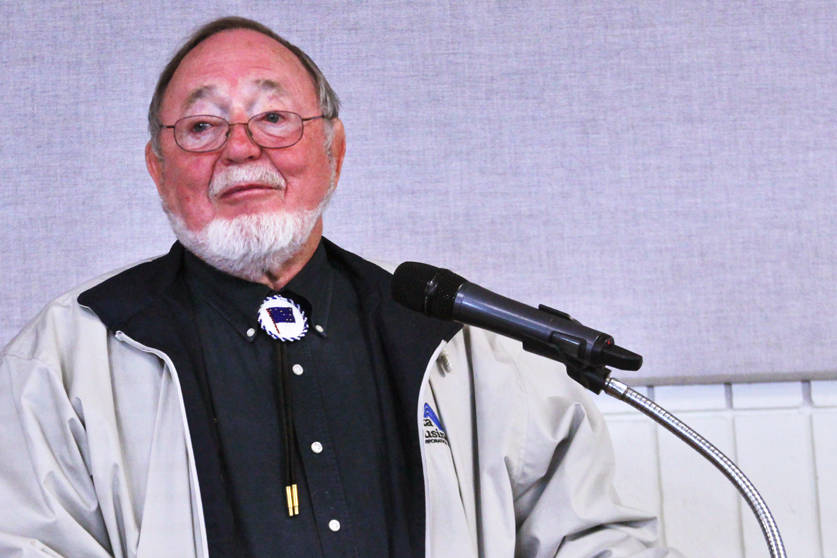Alaska’s 45-year veteran of the U.S. House, Rep. Don Young, is optimistic about the future of the state’s economy with expanded natural resource extraction.
“We’ve got a great future in the state of Alaska, resource-wise,” Young said during a luncheon address at a joint meeting of the Soldotna and Kenai chambers of commerce on Tuesday. “I’m very confident of that.”
He pointed to congressional action last December to open the Arctic National Wildlife Refuge to oil and gas leasing as a victory after a long quest. Congress included the leasing provision in tax reform legislation.
Another reason for his optimism is the potential for opening the Arctic to more shipping and mining as climate change shrinks the ice cover.
Young, Alaska’s sole representative in the House, in January became the longest-serving current member. This year, he will face a challenge for the 23rd time. The filing deadline is June 1. So far, Dmitri Schein, Carol Hafner and Alyse Galvin have announced for the Democratic primary election Aug. 21 to win the right to take on Young in the Nov. 6 general election.
Expanding beyond oil into other resource industries such as timber, mining and hydropower is an important part of diversifying Alaska’s economy, Young said.
“We cannot continue to live off a product that has a volatile ability to change in its price,” Young said. “It just can’t be oil. … When the price goes up we don’t have any control of that, and when it goes down we don’t have any control of that. So we ought to be developing other resources in this state. This is a resource-oriented state, and if we don’t have any resources we don’t have any income.”
Speaking of the conflict between state and federal priorities, Young focused on a water rights dispute sparked in 2007 when the U.S. Park Service prohibited Anchorage moose hunter John Sturgeon from piloting a hovercraft on a river in the Yukon-Charley Rivers National Preserve. Sturgeon’s 2011 appeal to the 9th U.S. Circuit Court of Appeals failed, but the U.S. Supreme Court remanded it back to the Appeals Court for further review. In October 2017, the Appeals Court upheld the Park Service’s hovercraft ban, ruling that the federal government manages water rights on federal land.
Alaska’s congressional delegation supported Sturgeon in a November 2015 Supreme Court brief that said the Park Service’s argument was based on a misinterpretation of the Alaska National Interest Lands Conservation Act of 1980, taking “a provision that limits federal authority and transforming it into a wellspring of power over Alaska’s lands and resources.”
Sturgeon again appealed to the Supreme Court in January 2018, and in February the Alaska Department of Law filed a brief supporting his case.
Young said his office is considering legislation related to the Sturgeon case that “pertains to a definition of ‘waters’ and pertains to control.”
“We’re going to win the water battle — who owns the water, the federal government or the state of Alaska,” Young said.
Audience questions prompted Young to comment on two other possibilities for Alaska’s economy: the North Slope natural gas pipeline and marijuana.
The state-owned Alaska Gasline Development Corp. is leading the effort to build an 800-mile gas pipeline from the North Slope to a liquefaction plant and export terminal in Nikiski. Young said his office isn’t involved in state decisions and that the decisive factor for the estimated $43 billion project will be the global LNG market, which is “not as bright as some people may think it is, because of the surplus of gas we have in the Lower 48 now.”
“I’m not going to give you a rosy picture, I’m just saying it’s going to take a lot more work, and maybe a change in the global demand for gas,” Young said. “That’s what will make the difference for whether the gas line is built or not.”
Regarding Alaska’s nascent marijuana industry, Young said “it’s always been a state issue, and we’ll keep the federal government out of your arena.”
In February 2017, Young and representatives from three other states with legal recreational marijuana businesses announced they had formed the House Cannabis Caucus, with the goal of removing federal restrictions on state-regulated marijuana. Young said his focus is on giving marijuana businesses access to banking services.
Reach Ben Boettger at bboettger@peninsulaclarion.com.
